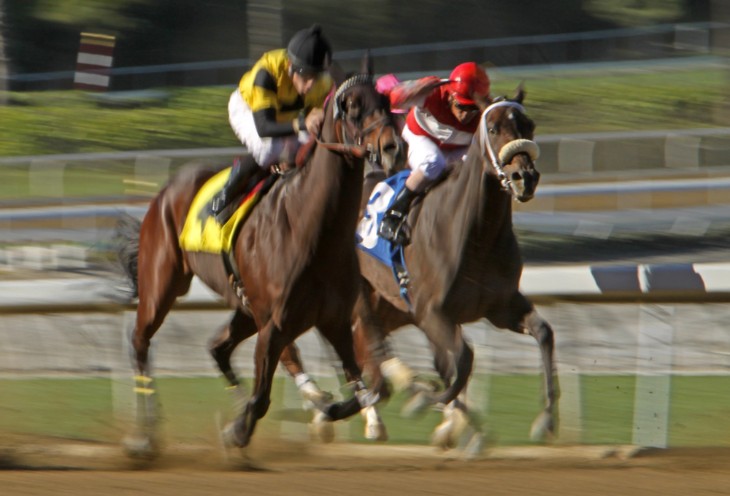In horse racing, victories often hinge on split-second decisions and photo finishes. Yet, behind the scenes, there's a complex strategy influencing a horse's racing trajectory. Central to this are the bloodstock agents, vital yet underappreciated figures in the industry. This article will discuss the crucial role of bloodstock agents and their importance in the realm of horse racing.
Bloodstock Agents
Bloodstock agents, often referred to as thoroughbred consultants, are professionals with a keen eye for evaluating equine talent and potential. They act as intermediaries, connecting buyers and sellers in the high-stakes world of horse racing. Their primary goal is to assist clients in making informed decisions when it comes to purchasing and selling racehorses. Bloodstock agents are well-versed in the intricate aspects of pedigrees, bloodlines, conformation, and performance histories, allowing them to assess a horse's racing potential with remarkable precision.
These astute individuals are known for their expertise in navigating the competitive bloodstock market. Whether their clients are seasoned owners, aspiring newcomers, or breeders looking to improve their stock, bloodstock agents play a pivotal role in guiding them through the complex process of acquiring top-quality racehorses.

The Bloodstock Agent's Role in Horse Racing
The role of a bloodstock agent goes far beyond being a mere middleman. They are knowledgeable advisors, making them a valuable asset in a sport where making the right decision can mean the difference between glorious victories and bitter defeats. A successful bloodstock agent possesses a diverse skill set, combining a blend of equine expertise, business acumen, and a deep understanding of the racing industry.
One of the crucial aspects of a bloodstock agent's role is to comprehend their clients' specific needs and preferences. Each racing stable or owner may have unique requirements based on their racing goals, budget constraints, and the level of competition they aim to participate in. By understanding these factors, the agent can tailor their search and recommendations, optimizing the chances of finding the perfect equine match.
Moreover, bloodstock agents are adept negotiators, striking deals that are mutually beneficial for both buyers and sellers. They analyze pedigrees, race records, physical attributes, and other pertinent information to establish a fair market value for the horse in question. Skillful negotiation ensures that clients secure the best possible horses at reasonable prices.
Understanding the Importance of Bloodstock Agents in the Industry
In the intricate tapestry of horse racing, bloodstock agents play a vital role in shaping the sport's future. Their expertise in assessing equine talent and potential has a ripple effect throughout the industry, impacting breeders, owners, trainers, and ultimately, the success of racehorses on the track.
For breeders, bloodstock agents act as valuable consultants, providing insights into market demands and trends. They can advise breeders on which bloodlines and sires are currently in demand, helping to maximize the commercial appeal of their breeding stock. This guidance not only boosts the breeder's reputation but also strengthens the overall thoroughbred gene pool, contributing to the continued improvement of the breed.
When it comes to racehorse owners, bloodstock agents are instrumental in guiding their investments. Acquiring a racehorse is a significant financial commitment, and making the right choice is of utmost importance. With their intimate knowledge of bloodlines and racing potential, agents can source horses that align with the owner's objectives, whether it's winning prestigious races or building a competitive racing stable.
Trainers also benefit from the expertise of bloodstock agents. They rely on the agent's insights to identify horses that suit their training programs and have the potential to excel in specific racing disciplines. By collaborating with a skilled agent, trainers can build a stable of talented and compatible horses, thus enhancing their chances of delivering exceptional results on race days.
Moreover, the impact of bloodstock agents extends beyond individual transactions. The horses they help acquire can influence the competitiveness of entire racing circuits. By matching the right horse with the right environment, bloodstock agents contribute to the diversity and strength of racing fields, making the sport more captivating for spectators and punters alike.
Qualities and Skills of a Successful Bloodstock Agent
The realm of bloodstock agents demands individuals with a unique blend of talents and attributes. To excel in this dynamic and competitive field, certain qualities are essential.
Equine Expertise
First and foremost, a successful bloodstock agent must be a true horse enthusiast. They should have a profound understanding of equine anatomy, behavior, and performance factors. This deep knowledge allows them to spot potential champions and identify any flaws or limitations in a horse's conformation or movement.
Analytical Mindset
Assessing pedigrees and bloodlines requires a sharp analytical mind. Bloodstock agents meticulously examine generations of racing history to unearth valuable insights into a horse's genetic potential. They must be adept at connecting the dots between ancestors and descendants, recognizing patterns, and making well-informed predictions about a horse's racing capabilities.
Networking Skills
Building and maintaining a vast network of industry contacts is crucial for a bloodstock agent. Whether it's liaising with breeders, trainers, owners, or auction houses, effective networking opens doors to valuable information and prime racing prospects.
Negotiation Prowess
As intermediaries between buyers and sellers, bloodstock agents negotiate deals that have a lasting impact on the industry. Strong negotiation skills are imperative to strike mutually beneficial agreements that satisfy all parties involved.
Integrity and Trustworthiness
The racing world values integrity, and bloodstock agents must embody these qualities. Clients rely on their agents to act in their best interests, making honesty and trustworthiness vital traits in this profession.
The Process of Selecting and Acquiring Bloodstock
For a bloodstock agent, the process of selecting and acquiring racehorses is akin to a delicate dance of art and science. It involves a harmonious blend of comprehensive research, keen observation, and astute decision-making.
The journey begins with understanding the client's objectives and budgetary constraints. Whether the goal is to find a potential champion or a competitive racehorse within a specific price range, the bloodstock agent tailors their search accordingly. Extensive research into bloodlines and racing records helps them shortlist candidates that align with the client's aspirations.
Next comes the exciting phase of attending horse auctions and sales. Here, the agent's expertise shines as they scrutinize each horse up for sale, meticulously evaluating physical attributes, conformation, and temperament. They look for subtle signs of potential and assess how well a horse's physique suits the racing discipline intended for them.
Furthermore, the agent takes into account a horse's pedigree to analyze the genetic potential it inherits from its ancestors. This historical perspective adds depth to the evaluation process, aiding in the prediction of a horse's racing capabilities and future breeding prospects.
Once potential candidates have been identified, negotiations ensue. A skilled bloodstock agent leverages their networking prowess and market insights to strike deals that offer the best value for their clients. Balancing the buyer's budget with the seller's expectations, they aim to create a win-win scenario that satisfies both parties.
The acquisition of a racehorse marks the beginning of a thrilling journey for owners and trainers alike. Thanks to the expertise and dedication of bloodstock agents, these magnificent athletes find their way into the racing stables, prepared to take on the challenges that lie ahead on the turf.

Evaluating Pedigrees and Bloodlines
In the realm of horse racing, a horse's pedigree acts as a powerful indicator of its potential racing prowess. It is a captivating tapestry woven with generations of champions, each thread contributing to the fabric of equine excellence.
Bloodstock agents are like skilled historians, delving deep into the ancestry of potential racehorses. They meticulously examine generations of thoroughbred lineage, tracing the triumphs and legacies left behind by distinguished ancestors. This journey through racing history allows agents to gain valuable insights into a horse's genetic makeup, providing a glimpse into its inherent racing abilities.
When evaluating pedigrees, agents look for patterns of success and consistency in the lineage. They seek to identify families that have consistently produced winning horses over several generations. By recognizing the influence of certain bloodlines and sires, agents can make educated predictions about how a horse may perform on the racetrack and its potential as a breeding prospect.
However, pedigrees alone do not guarantee success. An ideal racing prospect possesses a balance of speed, stamina, and resilience. Bloodstock agents consider the physical attributes and conformation of the horse in conjunction with its pedigree. The goal is to find the perfect blend of genetics and physique that aligns with the client's racing aspirations.
In the enthralling world of bloodstock evaluation, bloodstock agents use their expertise as both art and science. By deciphering the language of pedigrees and unraveling the stories behind bloodlines, they empower clients to make well-informed decisions in their pursuit of equine greatness.
Assessing Physical Attributes and Conformation in Horses
Beyond the pages of pedigrees and bloodlines, another essential aspect of a bloodstock agent's expertise lies in assessing a horse's physical attributes and conformation. This visual evaluation is a crucial step in determining a horse's potential for success on the racetrack.
When a bloodstock agent sets eyes on a prospective racehorse, they embark on a meticulous examination of its physique. They observe the horse from head to hoof, taking note of its overall balance and proportions. A well-balanced horse typically exhibits a harmonious blend of musculature, with no single body part appearing disproportionately larger or smaller than the others.
The agent pays close attention to the horse's limbs, assessing their straightness and angles. Correct limb conformation is vital for a horse's soundness and performance. Horses with well-aligned limbs are more likely to move efficiently and endure the rigors of racing without incurring injuries.
Moreover, the horse's feet play a crucial role in its ability to perform. Bloodstock agents look for well-shaped hooves that support the horse's weight and provide stability during galloping. Anatomically sound feet reduce the risk of lameness, a common concern in equine athletes.
The horse's movement is another key aspect under scrutiny. Agents observe the horse walking, trotting, and cantering to assess its gait and stride length. Smooth, fluid movements with adequate reach and drive are indicators of a horse's athleticism and potential on the racetrack.
As the bloodstock agent takes in the overall picture, they consider how the horse's physique aligns with its intended racing discipline. Some horses may excel in sprint races, possessing explosive speed, while others may demonstrate the endurance needed for long-distance events. Matching the horse's conformation with the desired racing goals ensures that clients invest in horses with the best chance of success.
The Art of Valuation and Negotiation in Bloodstock Transactions
In the fast-paced world of horse racing, the art of horse valuation and negotiation is a finely tuned skill possessed by adept bloodstock agents. The value of a racehorse is a multifaceted concept that encompasses its pedigree, physical attributes, race record, and potential for future success.
When assessing the value of a horse, bloodstock agents draw on their in-depth knowledge of the current market trends and demands. They analyze the horse's racing history, evaluating its performance in past races and the level of competition it faced. Horses with consistent wins and notable achievements command higher value, as they demonstrate their ability to excel in competitive environments.
The horse's pedigree plays a significant role in its valuation. Proven bloodlines that have produced successful racehorses are highly sought after, as they carry the potential for greatness passed down through generations. Additionally, a horse's lineage can influence its future breeding prospects, contributing to its overall value.
Physical attributes and conformation are also pivotal factors in horse valuation. A horse with exemplary conformation, sound limbs, and fluid movement is likely to fetch a higher price due to its athletic potential. Conversely, any conformational flaws or unsoundness may lower the horse's value.
Once the horse's value has been determined, the bloodstock agent steps into the role of a skilled negotiator. They collaborate with the seller to reach a fair price that reflects the horse's true worth while considering the buyer's budget and objectives. Effective negotiation involves striking a delicate balance, ensuring that both parties walk away satisfied with the deal.
The art of horse valuation and negotiation is where a bloodstock agent's expertise truly shines. Their ability to discern a horse's value and skillfully navigate the intricacies of price discussions enhances the overall success of bloodstock transactions.
Bloodstock Agents and Their Impact on Racing Success
In the realm of horse racing, the role of bloodstock agents transcends mere transactions. Their expertise and insights extend far beyond the purchase or sale of a racehorse. The horses they help acquire or place have the potential to shape the future of racing, impacting the sport on a grand scale.
A well-connected and experienced bloodstock agent can introduce clients to horses that might have otherwise remained undiscovered. By unearthing hidden gems with exceptional potential, these agents contribute to the enrichment and diversity of racing fields. The infusion of new talent invigorates the sport, enhancing the excitement for both racing enthusiasts and punters.
Furthermore, the impact of a bloodstock agent's expertise is seen on the racetrack. Horses carefully selected with the right mix of genetics and physical attributes have a greater chance of performing at their best. Their suitability for specific racing disciplines and training programs enhances their prospects of achieving success on the turf.
Bloodstock agents also play a critical role in breeding decisions. By advising breeders on selecting compatible mates for their broodmares or identifying promising young stallions, agents influence the future generations of racehorses. Their contribution to breeding programs can lead to the development of exceptional bloodlines, perpetuating the legacy of equine excellence.
Moreover, the success of a racing stable often hinges on the expertise of its bloodstock agent. By collaborating with agents who possess a keen understanding of the owner's objectives and the racing landscape, stable owners can build a formidable team of racehorses. This synergy between agent and owner optimizes the chances of achieving top-tier results and climbing the ranks of racing excellence.
In essence, bloodstock agents are pivotal players in the ecosystem of horse racing. Their impact goes far beyond individual transactions, shaping the industry's competitiveness, breeding standards, and the triumphs witnessed on racetracks worldwide.








